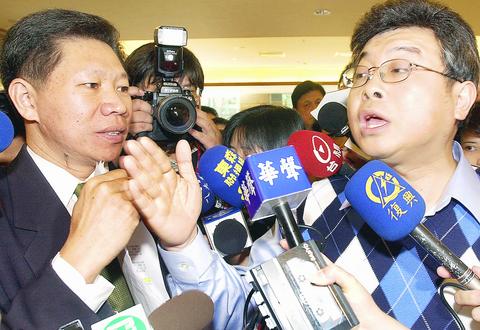Cooperation in the "pan-green" camp ground to a halt yesterday, after a TSU lawmaker accused three of his DPP colleagues of profiting through interfering with bids for the construction of the Fourth Nuclear Power Plant, sparking a near-physical confrontation and a day of angry recrimination.
In contrast to the behind-the-scenes resentment that has characterized their relationship in the past, yesterday's disputes were both severe and public, and appear to have seriously impaired the parties' relationship.

PHOTO: CHANG CHIA-MING, TAIPEI TIMES
First challenged by DPP lawmaker Wang Sing-nan (王幸男) at the legislative chamber, TSU lawmaker Su Ying-kwei (蘇盈貴) was later involved in an angry war of words at the entrance of the main legislative building with DPP lawmaker Cheng Tsao-min (鄭朝明) and his wife Huang Ying-chu (黃英桔).
Shouting erupted following Su's allegation, first made on Tuesday, that Cheng, along with two other DPP law-makers, Liang Mu-yang (
Su charges that the accused lawmakers interfered with the bidding process for the building of the Fourth Nuclear Power Plant in an effort to let certain companies win the contracts.
Huang, who is also an aide of Cheng's, demanded that Su must present his evidence.
Apparently losing her composure, Huang pushed Su and was poised to strike him when guards broke up the two.
In the legislative chamber a while earlier, Wang asked Su to show his proof and sign an agreement which would, Wang said, make certain that all individuals involved in the case would be held accountable for their conduct.
The agreement is supposed to have said that the three DPP lawmakers should resign if they are proved to have been connected to the scandal, otherwise the accusers, Su and PFP lawmaker Chiu Yi (
What's more, the dispute has provoked tension within the TSU, as most of its legislators would just as soon see the entire dispute come to a quick end.
For this reason, Su felt "betrayed" by their party comrades.
"It is not an issue that I can make an apology for. It is a matter of right and wrong. To have a sense of what's right and wrong is the basic principle of being a human being," Su said after his colleague, Huang Chung-yuan (黃宗源), offered an apology to the DPP on Su's behalf.
"My purpose [for identifying the DPP legislators] was to establish a sound system in the government. I had no intention of hurting anyone."
Huang Chung-yuan said earlier at a press conference that he was sorry his colleague has harmed the reputation of DPP lawmakers before presenting evidence finding them guilty. He said he would like to make an apology in Su's name.
Fearing that the fights would continue to strain relations between the "pan greens," leaders of the two caucuses have begun talks to calm tensions.
Nonetheless, legislators across party lines yesterday demanded an immediate investigation to ascertain the accuracy of the accusations.
The three DPP legislators involved in the incident ended the day maintaining their innocence and vowing to commit suicide if evidence shows they committed any misconduct in the case.

MAKING WAVES: China’s maritime militia could become a nontraditional threat in war, clogging up shipping lanes to prevent US or Japanese intervention, a report said About 1,900 Chinese ships flying flags of convenience and fishing vessels that participated in China’s military exercises around Taiwan last month and in January last year have been listed for monitoring, Coast Guard Administration (CGA) Deputy Director-General Hsieh Ching-chin (謝慶欽) said yesterday. Following amendments to the Commercial Port Act (商港法) and the Law of Ships (船舶法) last month, the CGA can designate possible berthing areas or deny ports of call for vessels suspected of loitering around areas where undersea cables can be accessed, Oceans Affairs Council Minister Kuan Bi-ling (管碧玲) said. The list of suspected ships, originally 300, had risen to about

DAREDEVIL: Honnold said it had always been a dream of his to climb Taipei 101, while a Netflix producer said the skyscraper was ‘a real icon of this country’ US climber Alex Honnold yesterday took on Taiwan’s tallest building, becoming the first person to scale Taipei 101 without a rope, harness or safety net. Hundreds of spectators gathered at the base of the 101-story skyscraper to watch Honnold, 40, embark on his daredevil feat, which was also broadcast live on Netflix. Dressed in a red T-shirt and yellow custom-made climbing shoes, Honnold swiftly moved up the southeast face of the glass and steel building. At one point, he stepped onto a platform midway up to wave down at fans and onlookers who were taking photos. People watching from inside

Japan’s strategic alliance with the US would collapse if Tokyo were to turn away from a conflict in Taiwan, Japanese Prime Minister Sanae Takaichi said yesterday, but distanced herself from previous comments that suggested a possible military response in such an event. Takaichi expressed her latest views on a nationally broadcast TV program late on Monday, where an opposition party leader criticized her for igniting tensions with China with the earlier remarks. Ties between Japan and China have sunk to the worst level in years after Takaichi said in November that a hypothetical Chinese attack on Taiwan could bring about a Japanese

The WHO ignored early COVID-19 warnings from Taiwan, US Deputy Secretary of Health and Human Services Jim O’Neill said on Friday, as part of justification for Washington withdrawing from the global health body. US Secretary of State Marco Rubio on Thursday said that the US was pulling out of the UN agency, as it failed to fulfill its responsibilities during the COVID-19 pandemic. The WHO “ignored early COVID warnings from Taiwan in 2019 by pretending Taiwan did not exist, O’Neill wrote on X on Friday, Taiwan time. “It ignored rigorous science and promoted lockdowns.” The US will “continue international coordination on infectious